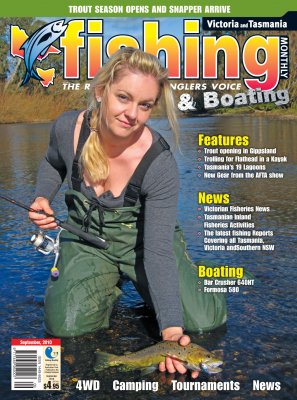Nineteen Lagoons in September by Graeme Bourke & Neil Carberry
 One of Tasmania's jewels of spring is the remarkable Nineteen Lagoon wilderness trout fishery.
One of Tasmania's jewels of spring is the remarkable Nineteen Lagoon wilderness trout fishery.
The greys and greens of the low-lying scrub roll on into the distance, split unnaturally by the red gravel road.
This immense area was once a large glacial bed. Thousands of years ago, the glacier carried within itself huge rocks and boulders. These boulders, along with the ice gouged out vast tracts of earth that eventually became depressions.
These shallow, dish-like depressions filled with water and became lakes. Some of these lakes eventually became stocked with trout and then nature saw to the further distribution of the brown trout.
In the winter, snow and rain combine to saturate the land, to fill all the lakes to the brim. Then they overflow creating small rivulets, which sprout out like the branches of a tree and eventually connect all the tiny lakes and tarns. The trout are able to move up these cold, clear turbulent streams and thus populate those waters that will eventually be isolated by the dry summer.
Each winter this cycle occurs, each winter the trout follow its instinctive urges for spawning and its ever-relentless search for food, and thus they are found in almost every nook and cranny.
A SEPTEMBER TRIP
In late September it is possibly a little too early to be venturing into the highlands, but what better way could there be than to spend one's spare time pottering about the lake country.
Frozen ice crackles underfoot and fingers and toes feel the cold. Why do we subject ourselves to this intolerable torture? For the trout of course!
I peered out into the cobalt blue waters that were calm and unruffled. I could only curse the damn frost as the eyes in my rod froze up once again. Nature has its own way and you have to fit in. You have no choice in the matter.
A thick bed of snow covered the ground, tiny flakes rested on the prickly branches of the kerosene bushes, bathing the land as far as I could see in a sea of white. The sky was grey, blanketing the land in a dismal, pallid aura. To accentuate the eeriness of the atmosphere there was no wind at all, nothing, not even a tiny wisp to ruffle the waters, not even a whirlwind to stir the powdered snow. It was extremely quiet.
I was standing on the edge of Double Lagoon looking down into crystal clear waters at my feet; every blade of flooded grass, every small stone could be seen. With slow movements I worked my way along the shore, I was somewhat perturbed at the lack of insect activity in the water. I couldn't see any stick caddis or water boatmen.
This is one of the problems with early season fishing, there is so much flooded land that it becomes a major task to find and identify the best sections to fish. With the huge spread of water it also becomes hard and sometimes dangerous to wade in these shallows.